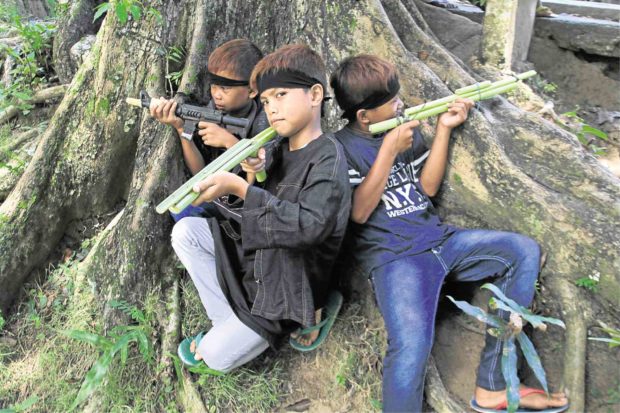
Children evacuees from Marawi City pose for a picture after acting out roles as Maute members during a play designed as trauma therapy for children who were driven away from their homes by the war on terror. —RICHEL V. UMEL
ILIGAN CITY — The war in Marawi City was far from being child’s play but children in an evacuation center here acted it out in a bid by authorities to deal with their trauma.
But who would play the bad guys? “I’m so beautiful to be a Maute,” said Shameera, 12, a child evacuee, who was asked to play the part of a member of the homegrown Islamic State (IS)-affiliated group.
Shameera’s role was to wave a black IS flag as other children playing terrorists’ roles were firing make-believe guns.
Shameera said the role she wanted to play was of a nurse treating wounded soldiers and civilians “but our director said I should be Maute.”
She pointed to Leslie, 14, another child evacuee who directed the play.
Another child evacuee, Orak, said he insisted on playing the role of a hostage “because I hate the Maute” and could not bear playing terrorist.
Unwanted role
“Even if it’s just a play, I did not want to become a Maute,” said Orak, 11, whose father teaches Arabic in a madrasa in Marawi City.
Orak and another child evacuee, Masiki, 9, said they wanted to play the role of a soldier but had been persuaded, along with another child evacuee, Jomar, to play roles as Maute gunmen.
“I don’t want to portray bad people,” Masiki said.
The boys relented only when told that the play would end in the Maute’s defeat.
The children asked to play roles as terrorists said they didn’t have difficulty acting. “We just have to kill and destroy,” said Jomar, giggling. “Besides we can rest early because we have to die in the play,” he said, raising his gun, made from a banana trunk.
Other children got what they considered to be ideal roles as soldiers.
Langkong, 12, said being a soldier was exactly what he wanted to be when he grew up. “I’d like to fight bad people,” said Langkong, son of a Maranao fisherman.
The boy said he wanted to defeat the Maute not only in a play. “I hate them. They destroyed our city,” he said.
Happy ending
As the loudspeaker blurted “Awit sa Marawi” composed by Vehnee Saturno, the children acted in the play, which also depicted the sufferings of displaced residents in evacuation centers.
The play, which was part of the children’s psychosocial activities, was performed at the Iligan School of Fisheries in Barangay Buru-un here on Saturday.
In the end, peace reigned.
Cpl. Angeline Cariaso, of the Joint Task Force Tabang, said the play was among activities designed to help children evacuees cope with the trauma of war.
Children of Marawi City walk back to their evacuation camp after participating in a play about the war that tore their communities apart. —RICHEL V. UMEL
“They portrayed the conflict naturally because of what happened to them and their families,” Cariaso said.
Cariaso said the play eventually ended with the bad guys reforming and joining efforts for peace.
“We wanted to impart to the children that, in spite of what happened, it is not good to exact revenge,” she said.
The United Nations Children’s Fund (Unicef) said the Marawi crisis threatened the development of at least 50,000 children and posed the risk of severe long term impact on children’s mental health.
Lotta Sylwander, Unicef country representative, said providing the children with child-friendly space could counter the ill-effects of the crisis.
“This helps them regain a sense of normalcy in their lives,” Jess Far, a Unicef child protection specialist, added. —Jeoffrey Maitem and Allan Nawal